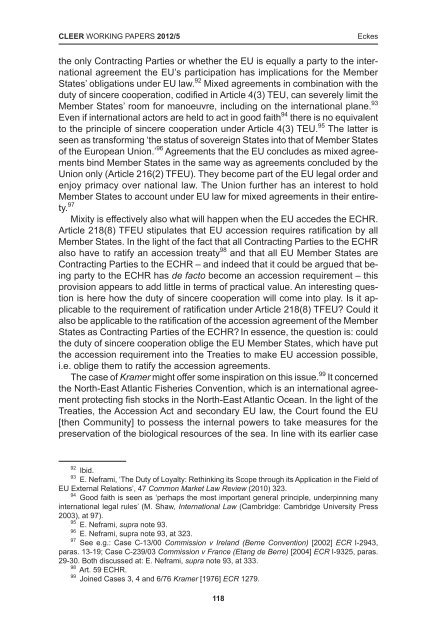Principles and practices of EU external representation - TMC Asser ...
Principles and practices of EU external representation - TMC Asser ...
Principles and practices of EU external representation - TMC Asser ...
Create successful ePaper yourself
Turn your PDF publications into a flip-book with our unique Google optimized e-Paper software.
CLEER WORKING PAPERS 2012/5<br />
Eckes<br />
the only Contracting Parties or whether the <strong>EU</strong> is equally a party to the international<br />
agreement the <strong>EU</strong>’s participation has implications for the Member<br />
States’ obligations under <strong>EU</strong> law. 92 Mixed agreements in combination with the<br />
duty <strong>of</strong> sincere cooperation, codified in Article 4(3) T<strong>EU</strong>, can severely limit the<br />
Member States’ room for manoeuvre, including on the international plane. 93<br />
Even if international actors are held to act in good faith 94 there is no equivalent<br />
to the principle <strong>of</strong> sincere cooperation under Article 4(3) T<strong>EU</strong>. 95 The latter is<br />
seen as transforming ‘the status <strong>of</strong> sovereign States into that <strong>of</strong> Member States<br />
<strong>of</strong> the European Union.’ 96 Agreements that the <strong>EU</strong> concludes as mixed agreements<br />
bind Member States in the same way as agreements concluded by the<br />
Union only (Article 216(2) TF<strong>EU</strong>). They become part <strong>of</strong> the <strong>EU</strong> legal order <strong>and</strong><br />
enjoy primacy over national law. The Union further has an interest to hold<br />
Member States to account under <strong>EU</strong> law for mixed agreements in their entirety.<br />
97 Mixity is effectively also what will happen when the <strong>EU</strong> accedes the ECHR.<br />
Article 218(8) TF<strong>EU</strong> stipulates that <strong>EU</strong> accession requires ratification by all<br />
Member States. In the light <strong>of</strong> the fact that all Contracting Parties to the ECHR<br />
also have to ratify an accession treaty 98 <strong>and</strong> that all <strong>EU</strong> Member States are<br />
Contracting Parties to the ECHR – <strong>and</strong> indeed that it could be argued that being<br />
party to the ECHR has de facto become an accession requirement – this<br />
provision appears to add little in terms <strong>of</strong> practical value. An interesting question<br />
is here how the duty <strong>of</strong> sincere cooperation will come into play. Is it applicable<br />
to the requirement <strong>of</strong> ratification under Article 218(8) TF<strong>EU</strong>? Could it<br />
also be applicable to the ratification <strong>of</strong> the accession agreement <strong>of</strong> the Member<br />
States as Contracting Parties <strong>of</strong> the ECHR? In essence, the question is: could<br />
the duty <strong>of</strong> sincere cooperation oblige the <strong>EU</strong> Member States, which have put<br />
the accession requirement into the Treaties to make <strong>EU</strong> accession possible,<br />
i.e. oblige them to ratify the accession agreements.<br />
The case <strong>of</strong> Kramer might <strong>of</strong>fer some inspiration on this issue. 99 It concerned<br />
the North-East Atlantic Fisheries Convention, which is an international agreement<br />
protecting fish stocks in the North-East Atlantic Ocean. In the light <strong>of</strong> the<br />
Treaties, the Accession Act <strong>and</strong> secondary <strong>EU</strong> law, the Court found the <strong>EU</strong><br />
[then Community] to possess the internal powers to take measures for the<br />
preservation <strong>of</strong> the biological resources <strong>of</strong> the sea. In line with its earlier case<br />
92 Ibid.<br />
93 E. Neframi, ‘The Duty <strong>of</strong> Loyalty: Rethinking its Scope through its Application in the Field <strong>of</strong><br />
<strong>EU</strong> External Relations’, 47 Common Market Law Review (2010) 323.<br />
94 Good faith is seen as ‘perhaps the most important general principle, underpinning many<br />
international legal rules’ (M. Shaw, International Law (Cambridge: Cambridge University Press<br />
2003), at 97).<br />
95 E. Neframi, supra note 93.<br />
96 E. Neframi, supra note 93, at 323.<br />
97 See e.g.: Case C-13/00 Commission v Irel<strong>and</strong> (Berne Convention) [2002] ECR I-2943,<br />
paras. 13-19; Case C-239/03 Commission v France (Etang de Berre) [2004] ECR I-9325, paras.<br />
29-30. Both discussed at: E. Neframi, supra note 93, at 333.<br />
98 Art. 59 ECHR.<br />
99 Joined Cases 3, 4 <strong>and</strong> 6/76 Kramer [1976] ECR 1279.<br />
118

















